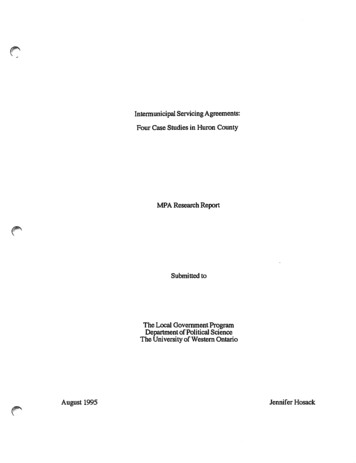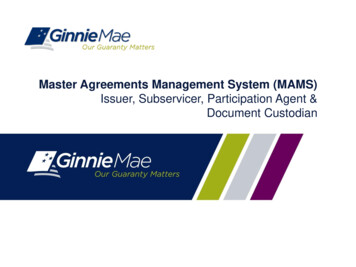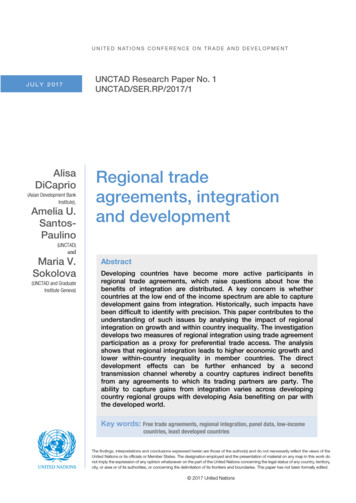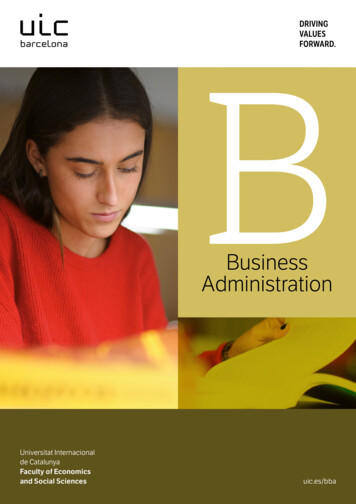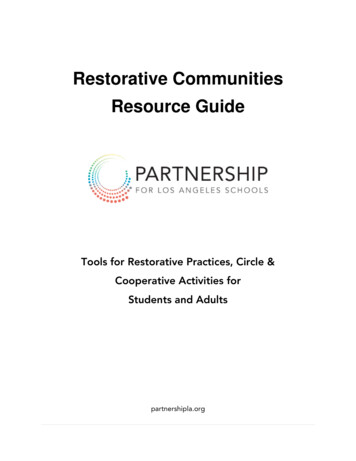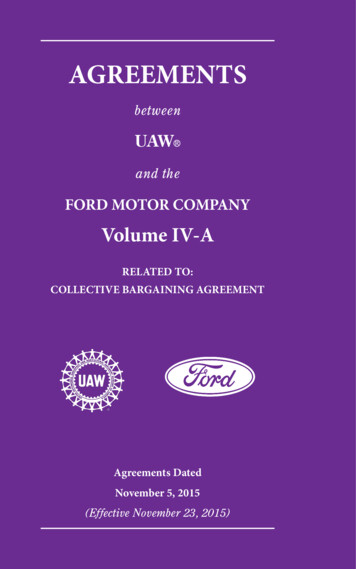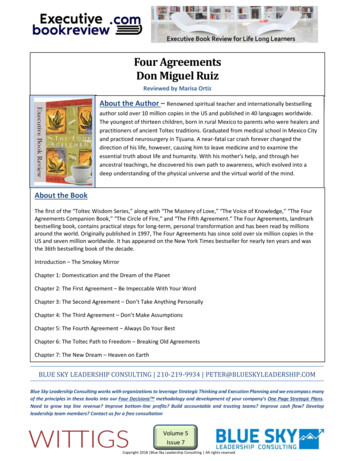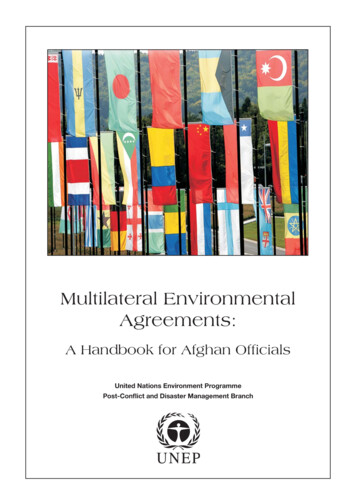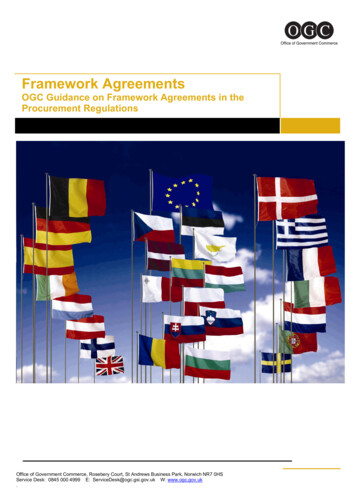
Transcription
Framework AgreementsOGC Guidance on Framework Agreements in theProcurement RegulationsOffice of Government Commerce, Rosebery Court, St Andrews Business Park, Norwich NR7 0HSService Desk: 0845 000 4999 E: ServiceDesk@ogc.gsi.gov.uk W: www.ogc.gov.uk.
Framework Agreements: OGC Guidance September 2008OGC Guidance on Framework AgreementsFramework Agreements in the 2006 Public Contracts and Utilities ContractsRegulationsContents1. Introduction2. What is a framework agreement?3 Setting up a framework agreement- Early considerations- Requirements of the OJEU Contract Notice- Award of a framework agreement4 Call-offs5 Examples of framework agreementsFigure 1: Framework agreementsFigure 2: Call-off StagePage 2 of 13
Framework Agreements: OGC Guidance September 20081.Introduction1.1The European Union (EU) Public Sector Procurement Directive 2004/18/EC 1 includesa provision (Article 32) on framework agreements. The UK Public ProcurementRegulations 2 which implement this Directive and came into force on 31 January 2006,cover this provision in Regulation 19. The Utilities Procurement Directive 3 andRegulations 4 include this provision at Article 14 and Regulation 19 respectively. Thisnote offers guidance to practitioners on the implications of the provision on frameworkagreements.1.2This guidance is not intended as a substitute for project specific legal advice, whichshould always be sought by a contracting authority where required.2.What is a framework agreement?2.1The Regulations define a framework agreement as:“an agreement or other arrangement between one or more contracting authorities andone or more economic operators which establishes the terms (in particular the terms asto price and, where appropriate, quantity) under which the economic operator will enterinto one or more contracts with a contracting authority in the period during which theframework agreement applies”.In other words, a framework agreement is a general term for agreements with providersthat set out terms and conditions under which specific purchases (call-offs) can bemade throughout the term of the agreement. In most cases a framework agreementitself is not a contract, but the procurement to establish a framework agreement issubject to the EU procurement rules. In a few circumstances it may be the case thatthe framework agreement itself is a contract in its own right to which the EUprocurement rules apply. This would be the case where the agreement places anobligation, in writing, to purchase goods, works or services for pecuniary interest (orconsideration in UK legal terminology). For this type of agreement, there is noparticular problem under the EU rules, as it can be treated in the same way as anyother contract.2.2However, the term ‘framework agreement’ is normally used to cover agreements whichare not, themselves, covered by the definition of a contract to which the EU rules apply(though they may create certain contractually binding obligations). Such agreementsset out the terms and conditions for subsequent call-offs but place no obligations, inthemselves, on the procurers to buy anything. With this approach, contracts areformed under the Regulations only when goods, works and services are called offunder the agreement. The benefit of this is that, because authorities are not tied to theagreements, they are free to use the frameworks when they provide value for money,but to go elsewhere if they do not.1stDirective 2004/18/EC of the European Parliament and of the Council of 31 March 2004 on the coordination of procedures for theaward of public works contracts, public supply contracts and public service contracts. Please .do?uri OJ:L:2004:134:0114:0240:EN:PDF.2Public Contracts Regulations 2006 (SI 2006 No.5): http://www.opsi.gov.uk/si/si2006/uksi 20060005 en.pdf.3stDirective 2004/17/EC of the European Parliament and of the Council of 31 March 2004 coordinating the procurementprocedures of entities operating in the water, energy, transport and postal services sectors. Please .do?uri OJ:L:2004:134:0001:0113:EN:PDF4The Utilities Contracts Regulations 2006 (SI 2006 No.6): http://www.opsi.gov.uk/si/si2006/uksi 20060006 en.pdfPage 3 of 13
Framework Agreements: OGC Guidance September 20082.3It is this form of agreement, where the framework itself cannot be readily classifiable asa contract for the purposes of the current Regulations, which has caused muchdifficulty in relation to the application of the EU procurement rules, and which isaddressed explicitly in the 2004 Directives and covered in this note. It should bestressed that the contractual status of a framework agreement should not cause undueconcern; the key is that a means of awarding contracts under framework agreements isprovided for without the need to re-advertise and re-apply the selection and awardcriteria from the outset.3.Setting up a framework agreementEarly considerations3.1It will be important to consider whether a framework agreement, as defined above, isthe right approach for the particular goods, works or services to be purchased. This willbe a value for money (vfm) judgement for the contracting authority or authoritiesconcerned, taking account of the kinds of purchases involved and the ability to specifysuch purchases with sufficient precision upfront. In particular, in order to be consistentwith vfm obligations the framework should be capable of establishing a pricingmechanism. However, this does not mean actual prices should always be fixed, butrather that there should be a mechanism that will be applied to pricing particularrequirements for call offs during the period of the framework. Even though it would bepossible to award the framework itself on the basis of quality criteria alone, with pricesbeing offered at a mini competition, this is unlikely to be consistent with vfm and isgenerally only considered appropriate in a few limited circumstances where it is notpossible to determine price or a pricing structure at the time the framework isestablished 5 . It should also be possible to establish the scope and types of goodsand/or services that will need to be called-off. There should not be any objection toupgrading the product, service or works required so long as it remains within the scopeof the original specification.3.2In using framework agreements, contracting authorities will need to ensure that theirobligations on issues such as sustainability, TUPE and the Code of Practice onWorkforce Matters are being met. The use of framework agreements does not removethe need to the address these issues, where relevant, in awarding a contract at thecall-off stage.5For example some energy or fuel procurements where because of price fluctuations bidders are not able to offer either price oreven a discount formula based on market prices.Page 4 of 13
Framework Agreements: OGC Guidance September 20083.3It is necessary to advertise a framework agreement in the OJEU, if its estimatedmaximum value over its lifetime exceeds the relevant EU threshold and theprocurements in question are not covered by one of the exclusions set out in theDirectives. When assessing the total value of the framework, a required field in theOJEU Contract Notice, it is important that the estimate should include all the potentialcall-offs over the lifetime of the agreement that may be made by all contractingauthorities that are permitted to use the framework, not just the intended call-offs by thecontracting authority which is procuring the framework agreement.3.4Contracting authorities that act as Central Purchasing Bodies may set up and advertiseframework agreements on behalf of other contracting authorities. Where the EU ruleshave been followed by such Central Purchasing Bodies, other contracting authoritiesmay use the framework agreements as required so long as they have been covered inthe OJEU notice (see paragraph 3.6 below).3.5Although the individual circumstances will need to be considered, it is worthconsidering whether to construct the framework so that it can have the maximum takeup across the public sector. This is particularly the case for items that are not alreadycovered by a pan government agreement. Having too many frameworks for the sameproduct or service will not encourage the market to bid or offer value for money ifbidders are not convinced about the likely level of take up.Requirements of the OJEU Contract Notice3.6The OJEU Contact Notice must:- Make it clear that a framework agreement is being awarded;- Include the identities of all the contracting authorities entitled to call-off under theterms of the framework agreement. The authorities can be individually named, or arecognisable class of contracting authority may be used – e.g. Central GovernmentDepartments, local authorities or health authorities in a particular region etc. Itshould be noted that European Commission guidance on frameworks 6 indicates thatclasses of contracting authority should be defined in a manner that enables“immediate identification of the contracting authorities concerned. It is notconsidered to be sufficiently precise to refer to all contracting authorities in aparticular region”.-When class descriptions do not allow ‘immediate identification of the contractingauthorities concerned”, a reference to where details of the authorities covered canbe obtained should be included in the notice. For example, if there is an accessiblelist of contracting authorities in a relevant “class”, or an organisation withresponsibility for maintaining details of the members of a “class”, that list ororganisation should be quoted in the Contract Notice and, where possible, a link tothis information included.- State the length of the framework agreement. It will be a maximum of four years“except in exceptional circumstances, in particular, circumstances relating to thesubject of the framework agreement”. It is understood that a longer duration couldbe justified in order to ensure effective competition under the framework agreementif four years would not be sufficient to provide a return on investment. It is worth6http://ec.europa.eu/internal c-dir-framework en.pdfPage 5 of 13
Framework Agreements: OGC Guidance September 2008considering, in any event, whether a framework agreement is necessarily the bestvehicle for a longer term project.- Include the estimated total value of the goods, works or services for which call-offsare to be placed and, so far as is possible, the value and frequency of the call-offs tobe awarded under the agreement (see paragraph 3.3 on assessing the framework’stotal value). This is necessary in order for providers to be able to gauge the likelyvalues involved and to provide a figure for the framework overall which, as withother contracts, should not normally be exceeded without a new competition takingplace.3.7Regulation 7 of the Public Contracts Regulations 2006 (and Regulation 10 of theUtilities Contracts Regulations) enables contracting authorities to reserve the right toparticipate in a public contract to supported employment programs, factories andbusinesses. The ability to reserve contracts in this way applies to frameworkagreements as well as to contracts generally. The OJEU Contract Notice, at the start ofthe procurement for the framework agreement, will need to make it clear that it isreserved for sheltered workshops (the term used for supported employment programs,factories and businesses in the EU Directive itself) under Article 19 of the PublicProcurement Directive (Article 28 of the Utilities Directive). Guidance on Article 19 isavailable at: OGC - Guidance on the 2006 Regulations.Award of a framework agreement3.8Once the OJEU Contract Notice has been despatched, the authorities setting up theframework agreements should follow the rules for all phases of the procurementprocess covered by the Regulations. This will include the use of the open or restrictedprocedures or, where the conditions for their use are met, the negotiated or competitivedialogue procedures, and adherence to the rules on specifications, selection ofcandidates and award. The 2006 Regulations do not explicitly prohibit the possibility ofconcluding framework agreements under the competitive dialogue or negotiatedprocedures. However, the complexity of most procurements conducted under theseprocedures often results in the award of a contract rather than the conclusion of aframework agreement.3.9Framework agreements can be concluded with a single provider or with severalproviders, for the same goods, works or services. In the latter case, there must be atleast three providers, as long as there are sufficient candidates satisfying the selectioncriteria and which have submitted compliant bids meeting the award criteria. Theagreement will establish the terms that will apply under the framework, includingdelivery timescales and daily or hourly rates. Figure 1 (at the end of this document)sets out the questions that need to be asked in order to establish how a frameworkagreement should be treated.3.10Contracting authorities awarding framework agreements will need to apply themandatory standstill (Alcatel) rules. The standstill period should apply to the award ofthe framework itself and not to contracts, or call-offs, awarded under the framework.For the detail on these rules, please see the separate advice on the MandatoryStandstill Period (Alcatel) on the OGC website 7 .3.11Section 4 describes the mechanism for calling-off contracts under a particularframework. However, OGC is aware that on occasion, a contracting authority may finditself in a position where there might be more than one framework or other contractual7Please see OGC - Guidance on the 2006 RegulationsPage 6 of 13
Framework Agreements: OGC Guidance September 2008vehicle that could meet its needs. For example, a department might be looking toprocure a new contract for IT services and find there is a choice of three establishedframework agreements that it could call-off from. It would be appropriate to consider thethree different frameworks as part of developing a procurement strategy, butcontracting authorities will need to ensure that any suppliers consulted at this stage areaware of the nature of this engagement as part of the pre-procurement process.3.12a.b.c.d.If a contracting authority proposes to consider the extent to which more than oneframework is capable of delivering its requirements, it is imperative that this iscommunicated to the marketplace openly. This includes, but is not limited to,consideration of the following matters:not engaging with suppliers in a covert or misleading way;not proposing that suppliers bid against prices offered under another framework;ensuring that if the possibility of using different frameworks to fulfil a requirement isused, that there are adequate processes in place to make sure that eachassessment is carried out in isolation (e.g. that those individuals involved in carryingout the mini-competition are not the same individuals who conduct a comparison);ensuring that the confidentiality provisions of each framework agreement areproperly respected4.Call-offs4.1When awarding call-offs (individual contracts) under framework agreements, authoritiesdo not have to go through the full procedural steps in the EU Directives again, providedthe rules were followed appropriately in the setting up of the framework agreementsthemselves. However, the relevant EU Treaty provisions and Treaty-based principles,including non-discrimination, still apply at this stage, and authorities need to be carefulto ensure that nothing is done which is discriminatory, improper or which distortscompetition. See Figure 2 (at the end of this document) for more information on thecall-off stage. Contracting authorities have some flexibility with regard to the award ofcall-off contracts within the following guidelines:- for multi-supplier frameworks where a call-off is required following a mini-competition,it may be permissible to vary the weightings of the award criteria provided that theintention to do this was publicised in advance and ranges are given for each criterion,to ensure transparency and avoid the unequal treatment of any suppliers;- for multi-supplier frameworks where a direct award is envisaged, it may bepermissible to vary the weightings at call-off to reflect the fact that requirements willvary from time to time in terms of cost/quality . However, procurers should allow someflexibility in their specifications to reflect the fact that their needs may change duringthe term of the framework;- criteria used for mini-competitions may differ from the award criteria used to set up theframework if they are related to (i.e. derive from) the original award criteria.4.2The length of call-offs under framework agreements is not specifically limited by theRegulations, although the Commission guidance referred to in paragraph 3.6 doesstate that call-offs, as well as frameworks themselves, should not last for more thanfour years. The length of call-offs, as with other contracts, should be appropriate to thepurchases in question and should reflect value for money considerations. It may be thecase that individual call-offs extend beyond the four-year term of the framework itself.Page 7 of 13
Framework Agreements: OGC Guidance September 2008However, this should not be done in order to circumvent the EU rules. For example, itwould be difficult to justify a 12-month call-off, very near the end of the framework itself,where the normal pattern for the goods or services in question had been for such calloffs to last for just one month at a time.4.3Where a framework agreement is concluded with just one provider, call-offs under theagreement should be awarded on the basis of the terms laid down in the agreement,refined or supplemented by other terms in the framework agreement but not agreed atthat time. It is the same principle as that applying to a normal contract, except that witha framework agreement, there will be an interval between the awarding of theframework itself and the calling-off of the goods, works or services under it. There canbe no substantive change to the specification or the terms and conditions agreed at thetime that the framework is awarded.4.4Where frameworks for the same goods, works or services are awarded to severalproviders, there are two possible options for awarding call-offs:Option one: apply the terms of the framework agreement4.5Where the terms laid down in the framework agreements are sufficiently precise tocover the particular requirement, the authority can award the call-off without reopeningcompetition. The Regulations do not specify how this should be done and the followingsection sets out some points that contracting authorities may find it useful to consider.4.6The reference in the Regulations to the terms laid down in the framework agreement isnot just a reference to the call-off terms and conditions, but also to the informationcontained in the framework which explains matters such as:- The circumstances in which the contracting authority envisages making a direct awardwithout further competition;- How the contracting authority would select the supplier to which an award is made, forexample by adopting an initial ranking of the suppliers on the basis of the awardcriteria used at the time that the framework was established;- How the contracting authority would select a subsequent supplier if the first supplierselected was unable to provide the requirement. For example, frameworks might beconcluded with five providers for the delivery of individual photocopiers, fax machinesand printers, separately priced, and for delivery within set timescales. If the authoritysimply wants to call-off some photocopiers, it would go to the provider offering themost economically advantageous offer, using the original award criteria, for that itemalone without reopening the competition. If that provider for any reason could notsupply the items required at that time, the authority would go to the provider offeringthe next most economically advantageous offer, and so on.4.7The process matters mentioned in the preceding paragraphs might also be reflected inthe provisions of any operational guidance/strategy that accompanies the managementof the framework agreement.Option two: hold a mini-competition between capable providers4.8Where the terms laid down in the framework agreement are not precise or completeenough for the particular call-off, a further or mini competition should be held with allPage 8 of 13
Framework Agreements: OGC Guidance September 2008those suppliers within the frameworks capable of meeting the particular need. Thisdoes not mean that basic terms can be renegotiated, or that the specification used insetting up the framework can be substantively changed. Substantive modifications tothe terms set out in the framework agreement itself are not permitted. It is more amatter of supplementing or refining the basic terms to reflect particular circumstancesfor the individual call-off. Examples of such terms are:- particular delivery timescales;- particular invoicing arrangements and payment profiles;- additional security needs;- incidental charges;- particular associated services, eg installation, maintenance and training;- particular mixes of rates and quality;- where the terms include a price mechanism;- individual special terms (e.g. specific to the particular products/services that will beprovided to meet a particular requirement under the framework).4.9Where a mini-competition is held for a particular call-off, the contracting authorityshould consult in writing (invite to tender) the providers within the framework that arecapable of meeting the particular need. This does not necessarily mean that everyprovider in the framework must be included. A framework may cover a number ofdifferent supplies or services, and there is no obligation to consult those providers thathad not agreed, when bidding for appointment to the framework, to provide theparticular supplies or services that are the subject of the call-off. Indeed, theframework may be divided into categories, each covering different supplies or services.In that case, the authority only need consult providers in the categories that cover thegoods or services required.4.10It is worth bearing in mind that splitting a framework into lots can help the market byallowing them to focus on the specific requirements that they would be interested inwith a smaller competition base rather than, for example, putting them up against apotentially large number of bidders in a global mini competition. It can also make theframework attractive to smaller companies by opening up opportunities that otherwisemight have been out of their reach. If the framework has not been set up in lots as ameans of separating out the services that a supplier can provide, then it would benecessary to invite all capable suppliers to tender for a mini-competition. If a frameworkhas lots but the requirement for a particular call-off spans more than one of the supplierlots then the suppliers in all relevant lots should be invited to tender.4.11It should be noted that there is no scope, at this stage, to run a selection procedure,based on technical ability, financial standing etc. This will have been carried out beforethe framework itself had been awarded and should not be repeated at the furthercompetition stage. The decision about which suppliers should be consulted must bebased on the kinds of supplies or services required and on which providers can supplythem, based on their offers at the time the framework agreement itself was awarded.4.12Contracting authorities should state the subject matter for the call-off for which tendersare being requested, and also a time limit that is sufficient to enable the selectedPage 9 of 13
Framework Agreements: OGC Guidance September 2008providers to submit their bids for the particular call-off. This time limit should takeaccount of the complexity of the call-off and the time needed for the different tenderersto submit their bids. In addition, where the authority has decided to make use of theoption to hold an electronic auction for the mini competition, it must abide by the rulescovering e-auctions as set out in the Regulations. Tenders should be submitted inwriting, and they should remain confidential until the time limit for their receipt hasexpired. The contracting authority should award the call-off to the provider which hassubmitted the most economically advantageous tender on the basis of the awardcriteria set out in the framework itself focusing on the particular requirement. Newaward criteria may be added as long as they relate to the award criteria set out in theframework agreement and weighting may be varied to reflect the particularrequirement. In the latter case contracting authorities should make it clear when thereis a range of weightings that apply to particular award criteria.5.Examples of framework agreementsFrameworks for supplies, services and works are allowed under the new provision.Examples of each type are as follows:- supplies from a single provider: a framework agreement is required for desks byone authority and is awarded, following OJEU and selection, on the “mosteconomically advantageous” basis to a single supplier. The authority calls-off itsrequirements for desks, during the period of the framework, on the basis of theterms agreed when the framework was set up;- supplies from several providers: a framework agreement is required to cover anumber of authorities’ paper needs over four years. Following the OJEU notice andthe selection process, based on financial and economic standing and technicalcapacity, bids are evaluated on the “most economically advantageous” basis forentry into the framework. A number of suppliers are included in the framework tosupply a variety of paper types – plain, lined, recycled, coloured etc – over the fouryear period. The authority goes to the supplier within the framework whose offer isthe “most economically advantageous”, based on the original award criteria, foreach call-off required throughout the four years. As the terms do not need to berefined or supplemented in this case, the authority has no need to use the minicompetition option;- consultancy services: a framework agreement is required for a range ofconsultancy services. An OJEU notice is issued and candidates for the frameworkare selected on the basis of financial and economic standing and technical capacity– including track record and ability. Bids are then evaluated at the ITT stage on the“most economically advantageous” basis, including quality systems and fee rates. Anumber of companies are included in the framework, covering the range ofconsultancy services required. Hourly rates for different grades of staff form part ofthe agreed terms. When there is a need to call-off specific services, within theframework, the contracting authority holds a mini competition with all providerscapable of meeting that need for the category of services required in order toestablish which company provides the “most economically advantageous” (vfm)offer for the particular mix of grades/rates required;- minor works: a framework is awarded to several contractors on a UK-wide basis,following OJEU, selection and award on the “most economically advantageous”basis. The contractors provide a range of services within categories, such asbuilding, plumbing and electrical services. Hourly rates, call out charges and levelsPage 10 of 13
Framework Agreements: OGC Guidance September 2008of quality are set under the framework agreement as well as information about howthe authority will select contractors as requirements arise. When a call-off isrequired, the authority goes to the contractor providing the “most economicallyadvantageous” offer, on the basis of the original award criteria, for the particularneed. There is no need for a mini-competition in this case, as the terms do not needto be refined. An alternative approach might be to award a framework to a singlecontractor for each region; and- major works 1: a framework is needed for units to be constructed as part of a majorworks programme. Following an OJEU notice and a selection process, based onfinancial and economic standing and technical capacity, a framework is awarded toa small number of prime contractors for units to be constructed as necessarythroughout the period of the agreement. The kinds of units in question might includeprison cells, categories of hospital beds (eg acute, accident and emergency etc),garages etc, where there is a standard size, design or requirement. The awards aremade on the basis of the particular mix of quality/unitary prices to meet the need. Atthe call-off stage, a mini-competition is held and bids are invited from all contractorscapable of meeting the requirement for the specific units, with the call-off awarded tothe contractor providing the “most economically advantageous” bid for the unitsrequired.- major works 2: a framework is required for the construction of standard buildingunits or office space in various locations over a four-year period. Following OJEUand the selection process, based on financial and economic standing and technicalcapacity, a framework is awarded to a number of prime contractors on “the mosteconomically advantageous tender” basis. Each of the prime contractors has theskills and supply chains necessary to undertake the different aspects of theconstruction work during the period of the framework. A decision is made, at eachcall-off, as to whether a mini-competition is needed – based on whether the termsneed to be refined. If a mini-competition is necessary, bids are invited from all primecontractors capable of meeti
Framework Agreements: OGC Guidance September 2008 OGC Guidance on Framework Agreements Framework Agreements in the 2006 Public Contracts and Utilities Contracts Regulations Contents 1. Introduction 2. What is a framework agreement? 3 Setting up a framework agreement - Early considerations - Requirements of the OJEU Contract Notice

